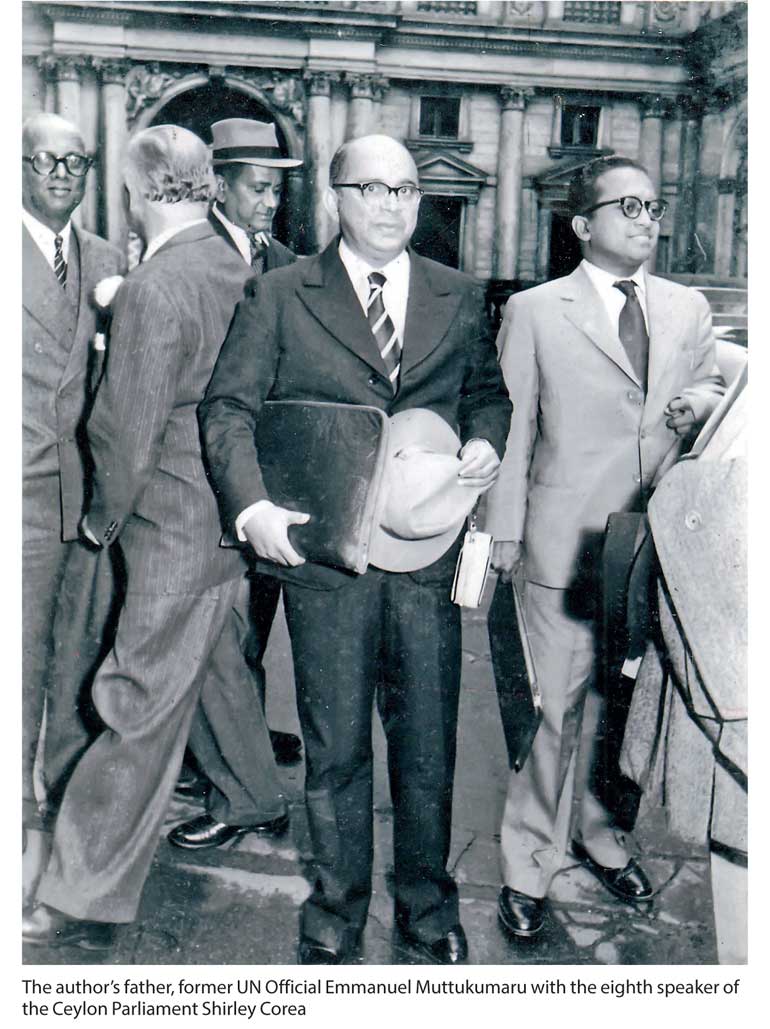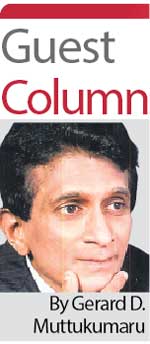Tuesday Feb 17, 2026
Tuesday Feb 17, 2026
Friday, 28 April 2017 00:00 - - {{hitsCtrl.values.hits}}

The British gave us a nation that was respected regionally and globally. In an earlier article, I stated that the leading companies in Sri Lanka today bear British names and were started by them. The Ceylon Civil Service was exemplary in the region. The universities were top class. Even the legendary Father of Singapore looked to Ceylon as an example of what Singapore could be. How ironic!
Today, students go to Singapore to study and leaders in business and government go to Singapore for almost everything, even medical treatment. Today, we look to Singapore to learn how to run a civil service, hotels, universities and hospitals. I could go on and on.
What have we done in the last 60-plus years? What has happened to Sri Lanka and Sri Lankans? Was the good Bishop right as early as the 18th Century? I know he angered a lot of people with this observation. Would he be right today?
I am a Sri Lankan-born American who left the then Ceylon at the age of 10. My late father Emmanuel Muttukumaru, a lawyer and agriculture expert, served in the United Nations with some of the legends of Sri Lanka. They include one of the stars of the then Ceylon Civil Service Andrew Joseph, one of Asia’s most respected journalists Varindra Tarzie Vittachi, Gamani Corea and Raju Coomaraswamy. They were contemporaries and very good friends. My father and the eighth Speaker of the Ceylon Parliament Shirley Corea, were both lawyers in Chilaw and Chairmen of the Planters Association. What has happened today to Ceylon, now Sri Lanka?
What I see should disturb every Sri Lankan today, especially the comfortable and complacent elite and those in positions of leadership and power in business and government. How many times have we heard the phrase, “with great power comes great responsibility”?
The other day I was taken to the bar and lounge in one of the older membership clubs in Colombo. It was about 6 p.m. in the evening. The waiters and few customers present were glued to the news on a local channel. It was disgusting. Murder, rape, accidents and even a disturbing scene in Parliament was shown. I immediately asked the manager to change the channel and requested a Bollywood movie. Psychiatric and psychological research tells us that what we watch affects us, how we see the world, how we behave in our homes and in organisations and how we treat our fellow citizens. I saw a recent article which described what a beautiful language Sinhala is and what we have done to it today in the way we speak to each other.
Sri Lanka and Sri Lankans must change everything today if we are to become a better people and a better nation. Catholic and fundamentalist evangelical churches are full. Buddhist and Hindu temples are packed on special days. So are mosques every Friday. But this does not make us a better people and a better nation. We all seek absolution for the terrible things we do and say to each other. The Oscar winner Leonardo Di Caprio observed in the terrific film Blood Diamond: “Sometimes I wonder if God will ever forgive us for the terrible things we have done to each other”. There are always exceptions in every society. Many good, but flawed, people devote their lives to making the lives of other human beings, especially the most vulnerable, better. But we rarely or never hear about them. Good news is always much better than the terrible news we see and hear every day.
Most young people, with the possible exception of the children of the rich and powerful, do not see a future in Sri Lanka. Many ordinary Sri Lankans who are parents don’t see a future either and what is more tragic is that they cannot identify one future leader for the country. Almost every street in the cities has a sign – “Spoken English Classes”. The one great gift that the British left us – English – the language of international business, international relations and global education, was destroyed in one single stroke.
In the interest of space and to begin the conversation, I have selected three areas we can begin with:
No subject is more written and talked about than leadership. In the last week, British Prime Minister Theresa May, in announcing a  snap election, used the word leadership several times. The opposition leader Jeremy Corbin has even questioned her “fitness to lead”. In America, Former President Obama, then-candidate Hillary Clinton and even the staunch Republican Former Defence Secretary Robert Gates questioned Donald Trump’s “fitness to lead”. What is this fitness to lead? In Sri Lanka, are our leaders “fit to lead”? I still don’t know. But I do know one thing. I have written over and over again that the only leadership that matters is leadership by example and servant leadership. The greatest leader the world has ever known once said of himself: “The Son of Man came to serve and not to be served”. He washed the feet of his followers. What example are our current Government and business leaders setting? Leaders and parents, the children are watching you. Perception is everything. Business and political acumen is one thing but what really makes the difference is moral leadership. Very few really respect our current leaders. They may respect the office but not the person who occupies it.
snap election, used the word leadership several times. The opposition leader Jeremy Corbin has even questioned her “fitness to lead”. In America, Former President Obama, then-candidate Hillary Clinton and even the staunch Republican Former Defence Secretary Robert Gates questioned Donald Trump’s “fitness to lead”. What is this fitness to lead? In Sri Lanka, are our leaders “fit to lead”? I still don’t know. But I do know one thing. I have written over and over again that the only leadership that matters is leadership by example and servant leadership. The greatest leader the world has ever known once said of himself: “The Son of Man came to serve and not to be served”. He washed the feet of his followers. What example are our current Government and business leaders setting? Leaders and parents, the children are watching you. Perception is everything. Business and political acumen is one thing but what really makes the difference is moral leadership. Very few really respect our current leaders. They may respect the office but not the person who occupies it.
An elected government leader must devote almost 100% of his or her time not on overseas trips looking for aid, deals and attending conferences, but on making the lives of the least of all citizens safer and better. If the leader observes this rule, the money will come. Every project must meet the test of improving the lives of the least of these citizens. What have these deals and loans done to the country today?
Sri Lankans must start respecting each other with all the flaws that we all have. Words are very powerful – “the tongue is a fire… it both blesses and curses”. Parliamentarians must treat each other with respect. Disagreements? Of course. But these disagreements must not be personal. They must be expressed respectfully. The most visible public servants, the Police, must treat the citizens they serve with humility and respect. Husbands, wives and children must see respect in their homes. In our hotels, financial institutions, hospitals, schools, universities and other workplaces, respect for one another must be paramount. We must treat and talk to each other the way we talk to and treat the “Suddha” and other foreigners. Do we keep our promises? Do we keep our word? Keeping your word defines who you are as a person. Do we always do the right thing? Are we teaching our children and students to do the right thing? Do unto others what you want done to you is the golden rule. How many of us live by this rule?
“A house divided against itself cannot stand”. Sri Lankans must come together to solve the very serious problems that confront the nation, the society and families. The divorce rate in Sri Lanka is now alarming. There should be no Sinhalese, Tamils, Muslims and Burghers. There should be only Sri Lankans. Are Sri Lankans a people who care about each other?
Let me conclude by posing five questions to which I welcome answers from readers: Other than the occasional victories in cricket, what has Sri Lanka done right in the last 40 years? This is a beautiful country, but are its people who love to party also “vile”? If the elected leaders don’t deliver and begin solving the critical problems facing the nation, in this democracy, what are you as a citizen prepared and willing to do, to make this nation what it should and could be? Is there honour in our business and government leaders? If you are an educator, what are you doing to teach honour, not expediency, in your classrooms?
(The writer can be reached at [email protected])